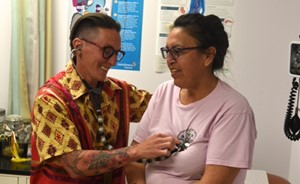Managing difficult situations
Having health issues can be stressful enough, but sometimes they are made worse by family, friends, or healthcare providers. Being prepared for these potential situations can help you to constructively address conflicts that may arise.
There may be people who disagree with who you’ve selected as your family of choice. Some people may not agree with your choice of healthcare advocate or substitute decision-maker. Others may not agree with the choices you have made for your healthcare, such as:
- Staying at home or going to a care home.
- Who your family/friend caregiver is.
- Medications and procedures that you want or do not want.
- or how much personal information you wish to share.
You may have decided not to see certain people, and you have the right to make that choice. Some people may try to contact you even though you do not wish to see them. They may try to make you feel guilty about your choices and even pressure you to forgive and forget. Having a healthcare advocate who knows your wishes can be beneficial in this situation. They can explain to unwanted visitors that you have made certain decisions and wish them to be respected.
If you’ve chosen not to have contact with someone, you may be struggling with complicated or confusing feelings. While the care team may not be able to repair the damage to your relationship, there may be team members who can offer you support and help you come to terms with the situation. You may also want to seek support from a professional counsellor who isn’t otherwise involved.
“One of most helpful things was that my therapist told me it was OK to be angry because I was discriminated against and it wasn't fair.”
Even under the best circumstances, you may encounter difficult situations such as insensitive comments, irrelevant or rude questions, rough treatment, impatience, or dismissal of your concerns. As you meet new care providers, you may also feel frustrated at having to answer the same questions or explain parts of your identity over and over.
“I felt like I was educating them about both being Indigenous and Two-Spirit. They were interested; but they seemed shocked that we were married. They needed more training; but why was I having to educate them? Why didn’t they have Indigenous people come in to do workshops and training?”
Deciding how to handle these situations can be tricky. The way that you choose to respond is a personal decision that may depend on factors such as:
- How ill or how vulnerable you feel.
- How much trust you have in a care provider.
- If you can choose to receive care elsewhere or from someone else.
If you choose to speak with a healthcare provider about something that they said or did or that they failed to do or say, let them know how this affected you. Also, let them know what would be more helpful or supportive to you. As a patient, you have certain rights, and inclusive care requires care providers to learn from you by responding to your concerns, even your criticisms, without becoming defensive.
If a policy or practice is discriminatory, you can find out about the facility's complaints process. You might also meet with a manager and suggest changes that could be made. It’s a good idea to have your health advocate present to take notes and assist you if necessary. Consult the 2SLGBTQ+ Canadian Healthcare Bill of Rights for Advanced Illness, Frailty and End of Life to learn more about your rights.
When you’re seriously ill and dependent on other people for care, you may easily become overwhelmed and not know how to handle what’s happening. Consider asking someone whom you trust to support you. This might be:
- A friend, partner, or someone from a Two-Spirit, Indigenous, or LGBTQ+ organization.
- A member of your care team. Spiritual care providers and social workers can act as advocates by facilitating honest and open conversations.
- Your healthcare centre’s patient advocate or patient advisory committee.
Read more
- Finding inclusive care
- My Choices for Safe and Inclusive Care
- Planning for my Care
- 2SLGBTQ+ Canadian Healthcare Bill of Rights
Resources
Videos
More Articles

Leaving a legacy

What does "2SLGBTQ+" mean?

Planning ahead: Your wishes

How to be an ally

How to provide inclusive care to Two-Spirit & LGBTQ+ people

Getting the care that you need

About your grief

Choosing a healthcare advocate

Finding 2SLGBTQ inclusive care

Making an advance care plan

Choosing a financial advocate

Making a will

Finding inclusive continuing care

Why inclusivity matters

For family, friends, and unpaid caregivers

Canadian Healthcare Bill of Rights

My Choices for Safe and Inclusive Healthcare
Featured Content

2SLGBTQ+ Canadian Healthcare Bill of Rights
Read More
MyGrief.ca Module - Grief in 2SLGBTQ+ communities
Read More
My Choices for Safe and Inclusive Healthcare
Read More
Planning for My Care
Read More
2SLGBTQ+ Knowledge Synthesis
Read More
Webinar: Improving access to respectful & inclusive care.
Read More
2SLGBTQ+ Canadian Healthcare Bill of Rights Infographic
Read More



